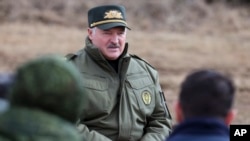Belarus sentenced two more journalists to prison last week in what media groups say is a continuation of a crackdown on media since the contested 2020 election and protest movement.
A court in the city of Mogilev sentenced freelance reporter Ales Sabaleuski to four years in prison and cameraman Yauhen Hlushkou to three years on extremism-related charges. Both were also ordered to pay fines of $2,450, according to media watchdogs.
The charges are linked to the journalists’ work with the independent news outlet 6TV Bielarus, according to the Committee to Protect Journalists, or CPJ. Belarus had earlier labeled 6TV Bielarus as an extremist group.
Gulnoza Said, CPJ’s Europe and Central Asia program coordinator, condemned the closed-door trial that took place last Wednesday, calling the Belarusian judicial system “rigged.”
The sentences are “yet another example of the Belarusian authorities’ relentless harassment of members of the press,” she said in a statement.
Belarus-based human rights groups, including Viasna, issued a statement calling on authorities to release the journalists, and to stop using prosecution to limit rights and freedoms.
Media and civil liberties groups say Belarusian authorities have used arrests and prison to target critics and opposition voices since the 2020 disputed presidential election. Mass protests spread across Belarus that year, after President Alexander Lukashenko was voted in for a sixth term.
The election had been widely seen as fraudulent, with opposition leaders imprisoned or threatened.
Belarus has since arrested dozens of journalists and labeled several media outlets as extremist organizations.
Data collected by Viasna show thousands of politically motivated arrests in the past four years, with at least 1,385 still imprisoned. CPJ additionally found 28 journalists imprisoned in Belarus for their work as of late 2023. That makes Belarus the third-worst jailer of journalists in the world, after China and Myanmar, the watchdog says.
The press office of the Belarus Foreign Ministry did not immediately respond to VOA’s request for comment.
Among those detained are Ihar Losik and Andrey Kuznechyk, who worked for VOA sister network, Radio Free Europe/Radio Liberty.
On the four-year anniversary of the election on Friday, the Belarusian Association of Journalists issued a joint statement with other watchdogs, calling on authorities to release all jailed media workers.
“Lukashenko’s regime has been crushing free speech and stripping journalists of their freedom for too long,” the statement said.
“We demand the immediate and unconditional release of our unjustly imprisoned colleagues, and express our solidarity with those who were forced to flee their country and still have to live in fear abroad. Belarusian authorities must stop harassing and intimidating journalists.”
Belarus ranks 167 out of 180 countries on the World Press Freedom Index and is considered one of the most dangerous countries in Europe to be a journalist.





